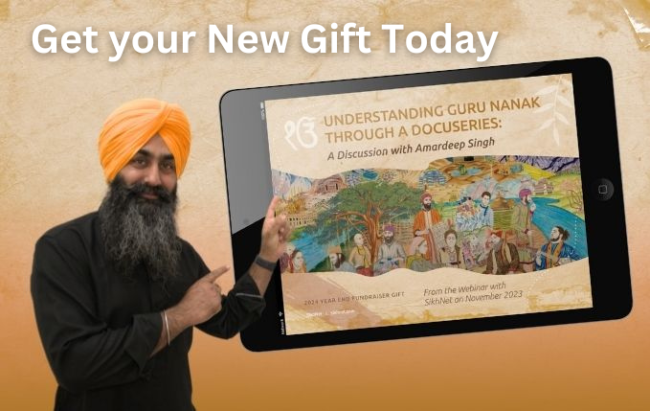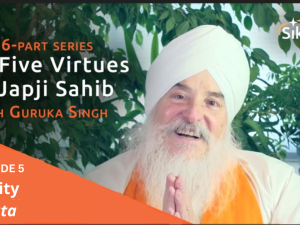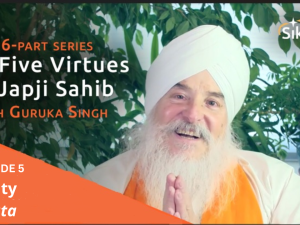 Just recently my nephew re-directed a snippet by Harjinder Singh in the Sikh Philosophy Network; he entitled it “Leaving Sikhism: I have been brought up as a devout Sikh (No meat, alcohol and so forth) for 19 years. For the past 2-3 years I have been contemplating leaving not just Sikhism but the entire idea of religion and God (I have about a 2% belief that God really exists.)
Just recently my nephew re-directed a snippet by Harjinder Singh in the Sikh Philosophy Network; he entitled it “Leaving Sikhism: I have been brought up as a devout Sikh (No meat, alcohol and so forth) for 19 years. For the past 2-3 years I have been contemplating leaving not just Sikhism but the entire idea of religion and God (I have about a 2% belief that God really exists.)
This has been brought about by things such as living in a multi-cultural London and witnessing first-hand the absurdity of religion, understanding that when somebody chooses a religion they automatically condemn the rest of mankind; that living a life in the service of a God that may not even exist is a wasted life and many more thoughts similar to these. And no these thoughts didn't come from brainwashing (lol!) or any one human I've come into contact with but rather through general knowledge reasoning and more importantly my studies in both psychology and philosophy. I guess what I'm looking for is an intelligent and informed take on my current situation which my parents, close family, friends and even my local Gurdwara could not provide to help me make this life changing decision.”
It was so heartbreaking to note that someone who was in Sikhi is drifting away from a faith that is unique and is fairly clear in its message to help achieve solace and salvation; the only way is to meditate on the name of God. God is One and the message is quite clear in the Mool Mantar which appears at the beginning of the Guru Granth Sahib and distils the essence of the Sikh faith. The creed of the religion, it was composed by Guru Nanak Dev Ji, the Founder of the Sikh faith.  The origins of Islam, Christianity, Hinduism, Confucianism, Judaism and other faiths were much earlier and Guru Nanak Dev Ji had the opportunity to analyse the faiths and to stamp out ritualism and idolatry; the Sikh dharm then came into existence. Its words are so important that the true meaning cannot be translated to give the true essence of the meaning; The Mool Mantar speaks of the Oneness of God and his eternal existence, and his role as creator and sustainer of all things. He is said to be beyond times, births and deaths (Ik Onkar Satnam Karta Purukh Nirbhau Nirvair Akaal Puruk Ajooni Saibhang Gurprasad). People know him through the Grace of the Guru, which means through himself, because Nanak always refers to God himself as the Guru. The pithy message of Naam japna (to be in tune with the infinite through meditation on the soundcurrent of the Shabd Guru so that the human becomes filled with His Naam), wand chakana (to share the fruits of earnings with the needy) and kirt karni (to earn one’s livelihood through creative, productive and honest labour) acts as the guidance and advice to live the Sikh way of life.
The origins of Islam, Christianity, Hinduism, Confucianism, Judaism and other faiths were much earlier and Guru Nanak Dev Ji had the opportunity to analyse the faiths and to stamp out ritualism and idolatry; the Sikh dharm then came into existence. Its words are so important that the true meaning cannot be translated to give the true essence of the meaning; The Mool Mantar speaks of the Oneness of God and his eternal existence, and his role as creator and sustainer of all things. He is said to be beyond times, births and deaths (Ik Onkar Satnam Karta Purukh Nirbhau Nirvair Akaal Puruk Ajooni Saibhang Gurprasad). People know him through the Grace of the Guru, which means through himself, because Nanak always refers to God himself as the Guru. The pithy message of Naam japna (to be in tune with the infinite through meditation on the soundcurrent of the Shabd Guru so that the human becomes filled with His Naam), wand chakana (to share the fruits of earnings with the needy) and kirt karni (to earn one’s livelihood through creative, productive and honest labour) acts as the guidance and advice to live the Sikh way of life.
Education equips an individual with detailed knowledge of any field, whether it is philosophy, psychology or law. Such knowledge prompts individuals to analyse the existence of God in scientific terms. Mysticism and personal spiritual links are difficult to explain and reason on the basis of science or theory. Analysis has no place for spirituality because it is ineffable and cannot be explained in logical terms. But the experience of this reality gives the individual the Grace and the strength to achieve his aspirations and ambitions in life. Saying that God exists but that he/she/it is not palpable or visible but can be experienced in meditation is akin to trying to tell someone what a strawberry tastes like if they have never eaten one. Better by far to simply offer them a strawberry.
There are many anecdotes (inspirational ones!) of others embracing the Sikh faith and it is worth reading their experiences. It is worth reading the experience by Georgia Rangel, now re-named as Jivanjot Kaur to get all the inspiration. I accept others coming into the faith but not leaving the faith after they have realised the benefits. She commented that the Sikh faith is a religion that has no place for misconceptions, fallacies or rituals. She derived a sense of peace and equipoise from the Gurbani (Dhhur ki Bani aaye.) She felt that the future of the faith is bright, wholesome and animated. It is to be practiced in every aspect with every breadth, depth and deed. The stories of two recent converts on Sikhnet brings forth the beauty of Sikhi.
Sikhs as a rule do not pursue people to convert them to Sikh faith. Sikhs do not give the world the impression that unless you convert to the Sikh faith, you are going to go to hell. However, Guru Nanak Dev Ji travelled saying a prayer, “Oh my kind master, Lord, I pray unto you, save this burning world". He's not talking about Panjab. He’s not talking about India. He’s talking about all of mankind. “With your kind grace, save this world.”
Guru Nanak Dev Ji saw the world burning in hate, anger, ego, greed, and other worldly entanglements. He was not trying to convert people to Sikh faith but was delivering the message of Oneness and helping people experience it. The people that got inspired by him became his followers and were known as Sikhs.
Guru Nanak Dev Ji comments on religion, “It doesn’t matter to me from which source one is inspired. My prayer unto dear God is, please take that person into Your arms, if that person is inspired to come and meet with You.” How you are inspired does not matter so long as you are inspired rightly into God’s arms and we should be tolerant enough to accept other’s sources of inspiration, which are certainly manifold.
Guru Nanak Dev Ji and the successive nine Great Gurus came into the world only 500 years ago. Could Sikhs say, “Unless you turn around and be Sikhs otherwise you will go to hell?” Absolutely not! Does that mean that before 500 years ago everybody went to hell? Absolutely not! Did everyone before Jesus burn in hell? According to the Sikh faith, Absolutely Not! Sikhs respect Jesus, Gautama Buddha, Muhammad and other prophets that came into this world to spread the message of God for humanity to love each other, but Sikhs do not believe that Jesus or any other prophet is the only way to meet God.
Sikhs do not pursue people to convert them into the Sikh fold but we do give information about the Sikh faith to anyone who asks for it. If someone is inspired, and wants to become a Sikh, they are welcome to the Sikh fold.
We believe in the concept of karma, the law of moral cause and effect that means that every word and action has a sequence and a consequence. The whole aim is to act consciously and live in spiritual bliss beyond the cycle of births and death (Charusi lakh jooni). By meditating on Naam, we achieve this state of perfection and experience the immediate presence of the One who is present everywhere in all things.
Sikhi is about serving the community. "Sewa" means selfless service. The sewa starts at home, then includes others and the world at large large. It finally becomes a way of being, so that everything one does is sewa.
We believe that everyone is part of the same God and that therefore all humanity are equal. Equality was advocated by the Sikh Gurus and the concept of the sangat (congregation) sitting on the floor (pangat) to partake of the same meal together reflects equality and fraternity.
Sikhs ethics are grounded firmly in the need to do good to all. It is the self-discipline of Sikhs to consciously practice the five virtues and confront the five vices. Self-discipline of meditation and daily sadhana dispels the power of the ego and allows Grace to enter one's life. Grace enables one to control lust, anger, greed, attachment and arrogance. Simplicity and humility arise naturally, and these attributes are a fertile ground for knowledge, bhagti (devotion) and self-discipline. The Sikh path fosters the the five virtues of truth, contentment, service, patience and humility. Such virtues are evident in those who are devoted to God.
 Anyone can live as a Sikh. After a certain age in life, if one does not have nitnem and sadhana, then one will not churn oneself. When milk is churned, it takes a lot of milk to make a little butter. As milk has to be churned to make butter, life has to be churned to bring out its essence. Gurbani works to churn the brainwaves through the hypothalamus. You need not be born as a Sikh to do this. In India, for example, there are a lot of Hindus and Muslims who recite Gurbani. Gurbani is for a person who wants to be graceful, a person who wants to be balanced, and a person who wants to do things by their radiance. A person's presence alone should see the job done.
Anyone can live as a Sikh. After a certain age in life, if one does not have nitnem and sadhana, then one will not churn oneself. When milk is churned, it takes a lot of milk to make a little butter. As milk has to be churned to make butter, life has to be churned to bring out its essence. Gurbani works to churn the brainwaves through the hypothalamus. You need not be born as a Sikh to do this. In India, for example, there are a lot of Hindus and Muslims who recite Gurbani. Gurbani is for a person who wants to be graceful, a person who wants to be balanced, and a person who wants to do things by their radiance. A person's presence alone should see the job done.
One creates the reality of one's own life through one’s actions. Those who act consciously during this span of human life, experience grace, while those who act in the grip of ego, spin out into depression and misery.
Meditating on Naam, serving everyone and being in the company of Sangat (like-minded, devoted people) nourishes the soul. This brings joy, contentment and solace.
Those who have experienced this and then choose to turn their backs on such a spiritual life lose the very centre of their life by choosing to orbit around money, power, possessions, family, sex or control of others rather than orbiting around the Guru and the Sangat. Any centre other than the Guru and the Sangat will ultimately fall away.
This how we learn. For the universe is a university, and we all must be graduated, sooner or later.
Eyewitness Companions - Religions by Philip Wilkinson, 2008
Mool Mantar - SikhiWiki - The Encyclomedia of the Sikhs
Discussion Forum of the Sikh Philosophy Network (Leaving Sikhism)






